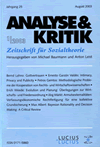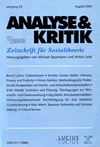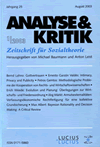Suchergebnisse
"Fabian Schuppert"
Titel: Comment on Michael Schefczyk
Autor: Fabian Schuppert
Seite: 213-217
In Search of a Just Political Economy: Why We Should Go beyond Rawls's POD and Schefczyk’s RUWS
Abstract: This commentary challenges Michael Schefczyk’s proposal for a realistically utopian welfare state (RUWS). As it stands, RUWS says too little about the concrete measures it will offer to avoid political domination and harmful inequalities. Moreover, RUWS follows Rawlsian Property-Owning Democracy (POD) by being silent on crucial issues such as banking regulation, the governance of investments and the issue of actual control over capital. Ultimately, it therefore seems that RUWS does not present an attractive alternative to POD since it suffers from very similar problems and shortcomings as POD.
Titel: Environmental Inequalities and Democratic Citizenship: Linking Normative Theory with Empirical Research
Autor: Fabian Schuppert / Ivo Wallimann-Helmer
Seite: 345-366
Abstract: The aim of this paper is to link empirical findings concerning environmental inequalities with different normative yard-sticks for assessing whether these inequalities should be deemed unjust, or not. We argue that such an inquiry must necessarily take into account some caveats regarding both empirical research and normative theory. We suggest that empirical results must be contextualised by establishing geographies of risk. As a normative yard-stick we propose a moderately demanding social-egalitarian account of justice and democratic citizenship, which we take to be best suited to identify unjust as well as legitimate instances of socio-environmental inequality.
Titel: Comment on Hans Bernhard Schmid: Coordination, Cooperation and the Origin of Normative Expectations
Autor: Fabian Schuppert
Seite: 57-64
Abstract: This comment suggests that coordination and cooperation are very different things, as the former simply is a device for problem-solving, while the latter relies on the existence of some shared intentionality. Similarly there exist different origins for the normative expectations an agent might form. Hence the comment argues that Schmid's taxonomy of action types, though helpful, needs to be extended and revised.

Property-Owning Democracy
2013 (35) Heft 1
Guest-Editors: Francis Cheneval / Christoph Laszlo
Editorial
In recent years, ’property-owning democracy’ (POD), defined by widespread ownership of productive assets, has become one of the key-factors in the assessment of the institutional design implied in John Rawls’s theory of justice. The wider implications of this inquiry also engage scholars who do not subscribe to Rawls’s conception of justice but are broadly interested in normative questions of political economy and the basic structure of a just polity. In the course of this debate, the in...

Environmental Justice: Empirical Concerns and Normative Reasoning
2014 (36) Heft 2
Guest-Editor: Gordon Walker
Editorial
In Why Things Matter to People Andrew Sayer reminds us that we are evaluative beings in which normative questions strongly figure in our everyday lives “because while we are capable and can flourish we are also vulnerable and susceptible to various kinds of loss or harm“ (Sayer 2011, 1). The ’environment’, understood in broad terms, provides one arena or frame within which evaluative questions necessarily figure, because of its centrality to our individual and collective flourishing or s...

Work and Cooperation
2011 (33) Heft 1
Editorial
Both in social theories with the aim of looking into the creative core of society as well as in everyday politics, two intuitions often supplement each other. The first intuition, empirico-analytical, views common organization of work and production as being the very aim of society, and other parts of society being explicable from this. A second intuition, ethical or moral, holds the sphere of work to be the central site for diagnoses of a society's inherent justice. Both intuitions not only con...